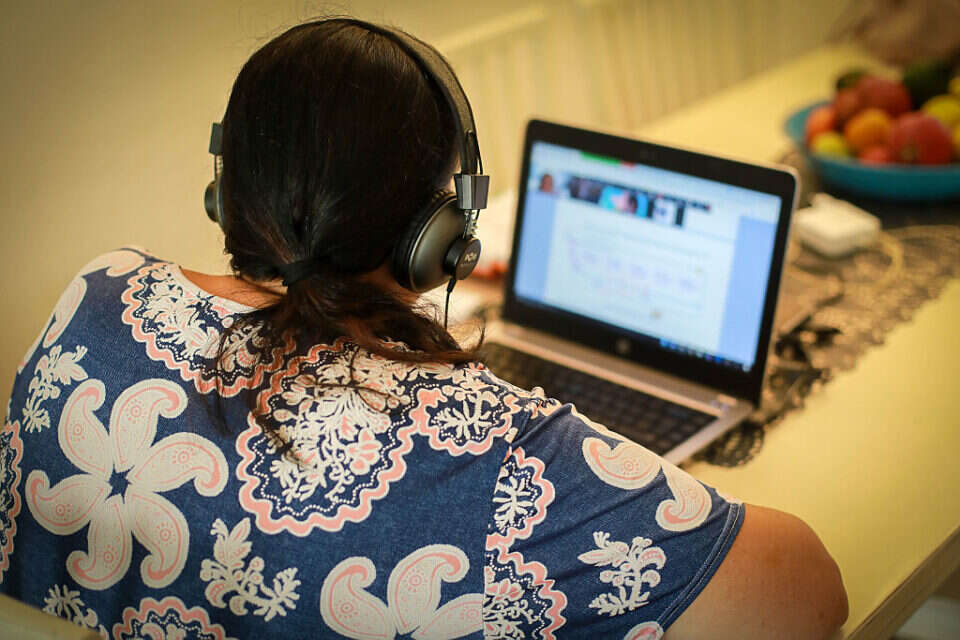As part of the social survey for 2020, 7,249 people aged 20 and over were interviewed at their home or by telephone, representing approximately 7.5 million people of this age in the country.
The expanded topic this year was Israel in the digital age - digital skills, access to information, receiving online services, communication, commerce, using apps, social networks, receiving online government services and so on.
According to the data, 90% of Israelis use the Internet.
47% of Israelis, ie about 2.66 million people, used the Internet to receive services from government ministries.
About half of them are aged 20-44, 32% aged 74-65 and 14% aged 75 and over.
The data show that Jews, academics and employed people use the Internet more than others to obtain government services.
These are 52% of Jews and 22% of Arabs, 65% of academics and 38% of non-academics, 57% of employed persons and 28% of non-employed persons.
Meanwhile, it was found that 37% of those aged 20 and over, ie about 2 million people, entered the website of the National Insurance Institute.
These are 40% of Jews and 23% of Arabs, 45% of those aged 20-44, 34% of those aged 64-45 and 20% of those aged 65 and over, 42% of the employed and 27% of the non-employed.
On the issue of digital health, according to the data, 11%, ie about 605,000 people, entered the website of the Ministry of Health.
This is 13% of people aged 20-44 and 4% of people aged 65 and over.
Of those who visited government websites on the Internet, 93% of those aged 20 and over who entered the Knesset website reported that the services they received met their needs, and 88% of those who visited the Population and Immigration Authority and the Ministry of Justice reported that the services they received met their needs.
In last place is the police website, with 77.6%.
As for the preferred way of communicating with government ministries, 37% of those aged 20 and over prefer to conduct communication with government ministries face to face, 32% online, 21% over the phone and 7% do not need service.
With increasing age, the proportion who prefer to communicate via the network decreases: 38% aged 44-20 and 16% aged 65 and over.
At the same time, the proportion who prefer to conduct face-to-face communication increases with age: 33% aged 44-20 and 43% aged 65 and over.
67% of those aged 20 and over whose level of command of reading Hebrew is weak, ie about 385,000 people, prefer to maintain contact with government ministries face to face.
29% of those who master reading at a very good level prefer this communication channel.
40% of those whose reading level in Hebrew is very good and 5% of those whose level of command in reading is weak or do not know at all, prefer to communicate with government ministries via the Internet.
Do we feel safe online?
According to the data, 49% feel confident in providing personal information on government websites.
These are 52% of men and 47% of women, 60% of those aged 20-44, 46% of those aged 64-45 and 25% of those aged 65 and over.
63% of Tel Aviv-Yafo residents feel safe providing personal information on government websites, 50% of Beer Sheva and Rishon Lezion residents and 37% of Arab Jerusalem residents - compared to 46% of Jews in the city.
On the other hand, 31% do not feel safe to provide personal information, and the rest do not use the Internet or did not know how to respond.
As for the skill in using the services of online government ministries, 66% of secular Jews and 37% of the ultra-Orthodox are skilled in the use of online government services.
There are differences between the residents in the different cities.
64% of Be'er Sheva residents, 61% of Tel Aviv-Yafo residents and 58% of Rishon Lezion residents are skilled in using digital technologies on the Internet in government offices.
Bnei Brak is at the bottom of the list of major cities, with 200,000 inhabitants and more, with 37%.
As mentioned, the national average stands at 54%.
47% of those aged 20 and over believe that the use of government services on the Internet is simple and clear.
Of those who have used the internet for government services, 69% believe that using online government services is simple and clear.
Of those who did not enter the sites of government ministries online, which are 48% of the population, 23% do not have proper training or do not know how to enter the sites.
65% answered that they did not go to these sites because they do not need to use, 6% answered that the services do not meet their needs and 4% do not have internet access.
One third (33%) of the Arabs and 20% of the Jews who did not enter government sites do not have appropriate training.
The services do not meet the needs of 8% of Arabs and 5% of Jews.
The Social Survey has been conducted by the Central Bureau of Statistics every year since 2002. The survey provides information on the living conditions of the Israeli population and its well-being in topics: housing, vehicles, health, education, Internet use, employment, recreation, contact with family and friends, volunteer activities, Economic status, perceptions, attitudes, satisfaction and trust.


/cloudfront-eu-central-1.images.arcpublishing.com/prisa/UIOA5AS4ZFAODDSJGFPWLJ7WZE.jpg)









/cloudfront-eu-central-1.images.arcpublishing.com/prisa/KMEYMJKESBAZBE4MRBAM4TGHIQ.jpg)


